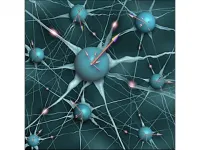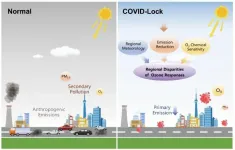(Press-News.org) Results from a new study which draws on survey data collected during the peak of the first wave of the pandemic suggests that being forced to slow down life, as a consequence of lockdown, has had significant, positive impacts for many people and their families.
The research, recently published in the British Journal of Psychiatry from a team at the University of Bath with international colleagues, analysed survey results from 385 caregivers of children aged 6-16 both in the UK and Portugal. Individuals completed an online questionnaire between 1 May 2020 and 27 June 2020.
This cohort had experienced considerable adversity because of COVID-19. 70% were working exclusively from home, almost half reported a reduction in income and nearly all children (93%) were being home schooled at the time. In addition, one in five identified at least one family member who was suspected or had been infected with COVID-19.
Yet despite all this, when asked the question - "Do you think there are any positive to come out of this pandemic and of the social distancing restrictions?" - 88% of respondents said 'yes'.
Their responses fell into four key areas, which the researchers describe collectively as examples of 'post-traumatic growth' - whereby individuals experience positive effects following stressful or traumatic events:
48% described a growth in family relationships. One participant explained how the lockdown had brought "closer relationships and a better understanding of each other." Carers also positively reported spending more time together as a family, had more involvement in their children's lives, and felt closer, whilst also feeling more connected to other family members.
22% described feeling a greater appreciation for life, involving the re-assessment of their personal values and priorities and the opportunity to 'reconsider what's really important'. This included increased appreciation and gratitude for the simpler things in life, with opportunities for 'reconnection with small pleasures' and less consumerism and reliance on material things. It also involved the adoption of a healthier lifestyle (22%) because 'life has slowed down', resulting in less stress and 'an opportunity to enjoy the garden and the quiet of the day.'
16% described spiritual growth, which involved a greater engagement with fundamental, existential issues. This included a greater appreciation for others (in particular health and essential workers), a 'stronger sense of community' and an 'acknowledgement of inequalities' (in particular outdoor space). It also included environmental benefits through 'less car use' creating less air pollution, which was 'better for the environment'.
11% described discovering and embracing new opportunities and possibilities, which was reflected in comments about changes in working practice, involving positive 'changes in attitudes to home working' and the adoption of a 'better work/life balance'. It was also reflected through opportunities to learn or develop new skills, particularly 'acquiring new technology-related competencies.' These were highlighted as particularly important by carers as they increasingly relied on technology for work, educating their children and socialising. Others described the positive opportunity to home educate their children, with one carer reporting: "I have always wanted to home school but cannot afford to...this has been a wonderful experience."
Lead researcher, Professor Paul Stallard of the University of Bath's Department for Health, explains: "Of course, the pandemic has affected all our lives in significant ways, most obviously the understandable and substantial negative impact it has placed on our mental health which we know has been acute for very many.
"But that is not the full story. Many respondents in our study emphasised what we had heard anecdotally about some of the positive effects people have derived from leading their lives in quieter, slower ways because of lockdowns.
"These are important findings. Not only do we identify what some of these positive experiences have been, but we also show that those people who have been able to find those positives had better mental wellbeing than those who did not. And it gives us clues about how we might build back happier and healthier by embracing aspects of a quieter life and those small, positives that have emerged from this period."
Co-author, Dr Ana Isabel Pereira of the University of Lisbon added: "This study also suggests strategies that families returning to a more restrictive lockdown in several countries can use. It is important, especially in these moments of high adversity, to find meaning and purpose in these experiences.
"In each moment, we can find new ways to connect and build stronger connections with our children, partner or friends; to choose how we can make the best use of this time of confinement and to help others in the community experiencing more adversity or with fewer resources navigate this period."
INFORMATION:
The research is published via BJPsych Open (2021) 7, e37, 1-5. doi: 10.1192/bjo.2021.1
Swapping the car for walking, cycling and e-biking even just one day a week makes a significant impact on personal carbon emissions in cities.
'Active transport' - cycling, e-biking or walking - can help tackle the climate crisis according to a new study led by the University of Oxford's Transport Studies Unit and including researchers from Imperial's Centre for Environmental Policy as part of the EU-funded project PASTA: Physical Activity Through Sustainable Transport Approaches.
Meeting greenhouse gas emissions reduction targets requires a significant move away from motorised transport. The team found that shifting to active transport could save as ...
Molecular iodine, a major emission from the ocean, can quickly convert to iodic oxoacids even under weak daylight conditions. These oxoacids lead rapidly to aerosol particles that significantly affect climate and human health.
Iodine-containing vapors that are emitted from oceans are a major source of aerosol particles. "Despite their importance to the climate, the formation of marine particles has been poorly understood," says Siddharth Iyer, Postdoctoral Researcher in Aerosol Physics Laboratory at Tampere University.
In this research, the formation of aerosol particles form from iodine-containing vapours under marine boundary layer conditions were studied. The experiments were carried out in the ultra-clean CLOUD chamber in CERN, where the nucleation and growth rates as well as ...
Cells, like humans, cast votes to make decisions as a group. But how do they know what to vote for? Researchers at the Francis Crick Institute and King's College London have uncovered how cells actively seek information in order to make faster and better collective decisions to coordinate the growth of new blood vessels. This provides a new basis for understanding intelligence in cells.
The process of how cells precisely and quickly coordinate action when they create new tissue is complex. They must collectively decide which cells should take on specific jobs and ensure that not too ...
Is a quantum machine really more efficient than a conventional machine for performing calculations? Demonstrating this 'advantage' experimentally is particularly complex and a major research challenge around the world1. Scientists from the CNRS2, the University of Edinburgh (Scotland) and the QC Ware, Corp., (France and USA) have just proved that a quantum machine can perform a given verification task in seconds when the same exercise would take a time equivalent to the age of the universe for a conventional computer. For this demonstration, they combined a complex interactive algorithm that solves a certain type of mathematical problem with limited information and a simple experimental photonics ...
Goal 7 of the Sustainable Development Goals (SDGs) aims to ensure access to affordable, reliable, sustainable and modern energy for all by 2030. Yet according to new research by Copenhagen Business School the poor planning and execution of decarbonisation strategies in emerging markets challenges the aims of Goal 7.
"In the effort to produce renewable energy and decarbonise their economies, emerging countries have neglected the effect on marginalised populations, which could ultimately prove unsustainable for all," says Assistant Professor Jacobo Ramirez from the ...
An important class of challenging computational problems, with applications in graph theory, neural networks, artificial intelligence and error-correcting codes can be solved by multiplying light signals, according to researchers from the University of Cambridge and Skolkovo Institute of Science and Technology in Russia.
In a paper published in the journal Physical Review Letters, they propose a new type of computation that could revolutionise analogue computing by dramatically reducing the number of light signals needed while simplifying the search for the best mathematical solutions, allowing for ultra-fast optical computers.
Optical or ...
A way of using machine learning to more accurately identify patients with a mix of psychotic and depressive symptoms has been developed by researchers at the University of Birmingham.
Patients with depression or psychosis rarely experience symptoms of purely one or the other illness. Historically, this has meant that mental health clinicians give a diagnosis of a 'primary' illness, but with secondary symptoms. Making an accurate diagnosis is a big challenge for clinicians and diagnoses often do not accurately reflect the complexity of individual experience or indeed neurobiology.
Clinicians diagnosing psychosis, for example, would frequently regard depression as a secondary illness, with implications for treatment decisions which focus more on ...
The outbreak of COVID-19 raised a question about the relationship between anthropogenic emissions and air pollution, which has aroused heated discussion. Research on air-quality changes caused by the lockdowns in different areas shows similar substantial reductions in primary emissions. However, regional disparities exist in responses of secondary pollutants to emissions reduction, especially fine particulate matter and ozone (O3).
Professor Ding Aijun and his team from Nanjing University explored global air-quality changes during COVID-19 lockdowns and regional disparities in O3 responses to emission reductions. They integrated multiple observational datasets, including global air quality ...
In a new study published in Journal of Extracellular Vesicles, Chen-Yu Zhang's group and Antonio Vidal-Puig's group at University of Cambridge report that pancreatic β cells secrete miR-29 family members (miR-29a, miR-29b and miR-29c) in response to high levels of free fatty acids (FFAs). These β cell-derived miR-29s are delivered to the liver, promoting insulin resistance and enhancing hepatic glucose output.
Over 100 years after insulin was discovered, it was believed that pancreatic β cells only secreted a single hormone--insulin. Pancreatic β cell-derived insulin regulates glucose homeostasis by binding with the insulin receptors located in the liver, skeletal ...
The scientists of Tomsk Polytechnic University jointly with the colleagues from Keysight company have conducted an experiment with an electron beam at the TPU microtron to study a super-radiant regime that occurs when radiation is generated by a train of electron bunches. The research findings obtained by a high-precision measurement of a spectral line width proved that about 8,000 electron bunches in a super-radiant regime form monochromatic Cherenkov radiation. This experiment was conducted for the first time. The fundamental research findings are published in the Scientific Reports academic journal (IF: 4.120, Q1) and can be used for further research on the new sources of radiation in the terahertz range.
A super-radiant regime is a coherent ...



